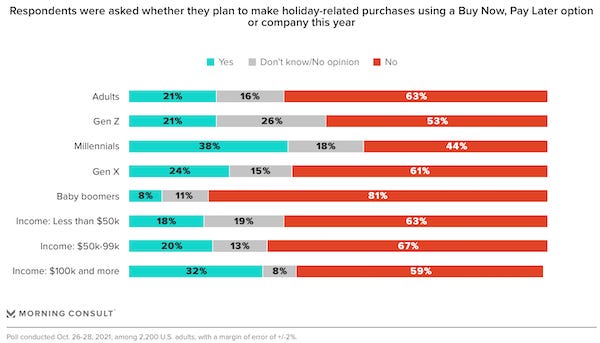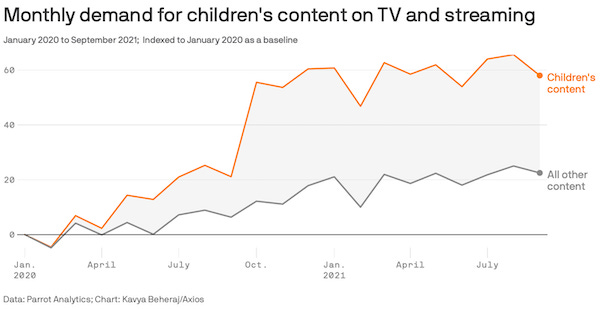Today’s posts that caught my eye:
Today’s top marketing award goes to Tuvalu's foreign minister Simon Kofe. Invoking my high school teacher’s mantra to “show, don’t tell” (“I’m from Missouri,” she would add. “You have to Show Me.”), Kofe gave his speech to the United Nations climate conference in Glasgow standing knee-deep in seawater to show how his low-lying Pacific island nation is on the frontline of the climate crisis, The Guardian reported.
Twitter giveth, and Twitter taketh away. The app released Twitter Blue, which for $2.99/month offers a number of nice features — especially a roundup of the most-shared articles from the people you follow called Top Articles that updates every 24 hours. On the other hand, after asking Twitter users decided Elon Musk should sell 10% of his Tesla holdings, Musk lost $50 billion in the last two days.
One of the largest US stock IPOs of the past decade is expected this morning: The electric vehicle maker Rivian has priced at $78 a share, significantly above expectations, the FT reports. The pricing would raise more than $10.5bn for Rivian at a market value of $66.5bn.
Subscribers support the creation of the newsletter, podcasts & live events.
The World
Wholesale prices rose 8.6% from a year ago in October, their highest annual pace in records going back nearly 11 years. The government’s producer price index, which serves as a gauge of finial demand prices from goods-producers, rose 0.6% for the month, an indicator that inflation pressures are continuing to pressure the U.S. economy. The monthly pace was faster than the 0.5% increase in September. Stripping out food, trade and energy prices, the index increased 0.4% month over month, slightly below the 0.5% estimate but an elevated pace from September’s 0.1% gain. On a year-over-year basis, core producer prices increased 6.2%. One-third of the increase in goods prices came from soaring gasoline, with prices rising 6.7%. Beef and veal prices represented the other side of the ledger, posting a collective decline of 10.3%. (CNBC)
A report released by the U.S. Holocaust Memorial Museum states the museum is "gravely concerned" the "Chinese government may be committing genocide against the Uyghurs." A growing number of governments and other institutions are concluding the Chinese government's policies toward the Uyghur ethnic minority aren't just repression, but in fact constitute genocide. (Axios, USHMM)
International companies are still expanding their footprint in China, according to an HSBC survey. (Bloomberg)
After nine days of grand pronouncements, pledges and plans, scientists delivered a rude awakening to a COP26 summit that has been called “the last, best hope” for climate action: Earth is on track to warm about 2.5 degrees Celsius (4.5 degrees Fahrenheit), eclipsing the world’s shared climate goal by a full degree. UN researchers found a massive gap between countries’ long-term promises to zero out carbon emissions and the official, short-term plans known as “nationally determined contributions,” or NDCs. (Washington Post)
Americans like to think they’re recycling their plastic. But, too often, that waste is shipped overseas, sometimes with the help of organized crime groups, where it litters cities, clogs waterways or is burned, filling the air with toxic chemicals. (Los Angeles Times)
'We are sinking': Tuvalu Foreign Minister Simon Kofe gave his Cop26 speech standing knee deep in seawater, prompting the question: Are you still a country if you’re underwater? (The Guardian, Washington Post)
Pfizer, BioNTech asked the FDA to expand their Covid-19 booster use to all adults. If the FDA grants the request, the companies’ booster shot would be cleared for people 18 years and older, in addition to certain high-risk adults already eligible. (Wall Street Journal)
Thousands of gyms, restaurants, movie theaters, shopping malls, salons and other indoor businesses in Los Angeles were required this week to start asking customers for proof that they had been fully vaccinated against Covid-19, under one of the nation’s strictest vaccination rules. (New York Times)
L.A. and San Diego Unified have directed teachers to base academic grades on whether students have learned what was expected of them during a course. The change comes amid a greater movement away from point-driven grading systems. (Los Angeles Times)
Some Gen Z job applicants are scrubbing campus political activism from their résumés. (Washington Post)
A federal judge in Washington ruled late Tuesday that hundreds of pages of Trump White House records can be turned over to a congressional committee investigating the Jan. 6 attack on the U.S. Capitol despite the former president’s objections. The decision by U.S. District Judge Tanya S. Chutkan clears the way for the release of government records requested by Congress, with a deadline of Nov. 12. Attorneys for Trump vowed to immediately appeal to the U.S. Circuit Court of Appeals for the District of Columbia Circuit. (Washington Post)
Republican Rep. Liz Cheney of Wyoming said that former President Trump is at war “with the rule of law and the Constitution” and that GOP lawmakers who sit by silently are aiding his efforts. (Associated Press)
Listen and you'll hear moderate Democrats using a new label for their own brand of politics: "Normal." It's a coded, loaded word exacerbating their divide with liberal colleagues. It's also a way, in the face of the dismal election trends, to distinguish themselves from activist colleagues they're implying are abnormal and don't speak for them. (Axios)

Economy
U.S. industrial giant General Electric will split into three companies following years of seeing its stock underperform. The company will be divided into separate units focused on aviation, health care and energy. GE plans to spin off the health-care unit by early 2023 and the energy unit by early 2024. The name GE will live on with the aviation company after the move is complete, and current CEO Lawrence Culp will continue to lead that unit. (CNBC)
‘The end of the GE we knew’: The breakup turns a page in modern business history. (Wall Street Journal)
The electric vehicle maker Rivian has priced its IPO at $78 a share, significantly above expectations, setting the stage for one of the largest US stock market debuts of the past decade. The pricing would raise more than $10.5bn for Rivian at a market value of $66.5bn, or $77bn on a fully-diluted basis. The Amazon-backed company is due to make its first trade on the Nasdaq exchange this morning. (Financial Times)
Elon Musk lost $50 billion in two days in a record wealth plunge, as Tesla erased $199 billion of value in its worst two-day rout in 14 months. (Bloomberg)
Why Hong Kong is building apartments the size of parking spaces: Property developers’ answer to Hong Kong’s affordable housing crunch is the microflat, measuring under 300 square feet. Although they are cheaper than larger alternatives, many are still far from affordable, with some of the roomiest spaces going for $1 million. They’re big enough for a bed, a small cabinet, a kitchenette and a bathroom — shower stall not guaranteed. At their peak in 2019, microflats represented 7% of all the city’s construction, and many today are nestled inside sparkling new residential towers. While loosened housing regulations helped give rise to these tiny homes, the city’s move to smaller units predates the policy change. (City Lab)
Should you re-onboard your employees? The perks of hybrid work and remote work flexibility have become commonplace among tech companies. But what hasn't become common is giving existing employees time to reacclimate to their new work environments. Even the most tenured workers need to be re-onboarded and oriented. This means clearly introducing workers to processes, policies and post-pandemic expectations just as you would do with a new hire. As organizations slowly reopen their offices, more leaders have begun to realize they have a change management issue on their hands. Leaders are handling an overhaul of organizational culture and processes directly on the heels of a very challenging 18 months. (Protocol)
For a non-trivial share of adults, cash, credit and debit aren’t the preferred method for purchasing — up to 23 percent of consumers plan to use another method most often to make their holiday purchases, such as layaway, gift cards or prepaid debit cards. Five percent of adults plan to use BNPL to cover most of their large gift purchases this year — the highest share across any category. A much higher share, however, plans to use BNPL to make at least some purchases. One in 5 adults plan to use BNPL this holiday season, and another 16% are undecided Millennials lead planned usage of BNPL for holiday purchases, at 38 percent. And while 21 percent of Gen Z adults say they are planning to use BNPL this holiday season, over a quarter are still undecided on how they’ll pay. (Morning Consult)
Technology
Meta, formerly Facebook, said it plans to eliminate advertisers’ ability to target people with promotions based on their interactions with content related to health, race and ethnicity, political affiliation, religion, sexual orientation and thousands of other topics. The move, which takes effect on Jan. 19, affects advertisers on Meta’s apps such as Facebook, Instagram and Messenger and the company’s audience network, which places ads in third-party apps. The is making the changes to limit the way that its targeting tools can be abused. In the past, these features have been used to discriminate against people or to spam them with unwanted messaging. (New York Times)
A bipartisan group of House lawmakers has introduced a bill that would require online platforms to let users opt out of having personal data-driven algorithms select the content they see. The bill shows that anger over how platforms use their algorithms to target users with specialized content is a bipartisan issue with momentum on Capitol Hill. (Axios)
Does Facebook make the world better? A semi-annual “Pulse Survey” of Facebook employees showed 50% of those employees said they believe Facebook, now known as Meta Platforms, “makes the world better,” according to a copy of the results viewed by The Information and a person familiar with the matter. The other respondents felt Facebook had a neutral or unfavorable impact. More than 57,000 of some 63,000 Meta employees responded to the latest survey. (The Information)
In a Roblox Q&A investor relations call, one recurring theme amongst the questions suggests an undercurrent of anxiety around Roblox’s ability to age-up its audience. Roblox bragged that 28% of the top 1,000 “experiences” on its platform qualify as “aged up”— meaning that a majority of users are over the age of 13. That proportion was just 10% a year earlier. Despite the growth, Roblox has a long way to go in proving its appeal beyond kids and teens. CEO David Baszucki said the platform is “right in the middle of” its transformation toward a more age-diverse user base. But there’s something else to watch here, especially as brands take note of the platform’s age transformation: Roblox says it’s looking forward to more “intentional” experiences created by other companies. That suggests the next big phenomenon on Roblox could be better captured by rights holders than by fan creators. (Reality Check)
Hundreds of junk-science papers have been retracted from reputable journals after fraudsters used ‘special issues’ to manipulate the publication process. The poor-quality papers — sometimes consisting of complete gibberish — were snuck in by scammers who impersonated scientists and offered to guest-edit special issues of the journals they targeted. Elsevier is withdrawing 165 articles currently in press and plans to retract 300 more, and Springer Nature is retracting 62 articles published in a special issue of one journal. There could be many more retractions to come. (Nature)
Twitter Blue, the company’s subscription service, is adding new features while expanding to new countries and platforms, launching in the US and New Zealand and on Android and the web. Perhaps the most useful Twitter Blue feature is an undo button, which lets customers recall tweets before they send. Twitter Blue also will get a lot more useful for people who love reading and finding news on Twitter. One feature lets people view ad-free articles on participating websites and gives a portion of revenue from Twitter Blue subscriptions to those sites. Twitter Blue will now offer a Nuzzel-like roundup of the most-shared articles from the people you follow called Top Articles that updates every 24 hours. (The Verge)
Kids content is crushing it on TV and streaming. (Axios)
Smart Links
Brian Williams says he’s leaving NBC News. (New York Times)
Moms with access to remote work were most likely to leave their jobs in pandemic. (Fortune)
What happens to all those Covid test sites after the pandemic?(Bloomberg)
Peloton freezes hiring after it slashes its forecast and shares drop. (CNBC)
Nvidia market value tops $800 billion as CEO adds fuel to the rally. (Bloomberg)
NASA delays ambitious human lunar landing to 2025. (The Verge)
As overdose deaths soar, DEA-wary pharmacies shy from dispensing addiction medication. (Kaiser Health News)
Netflix launches games to iPhone and iPad users worldwide. (TechCrunch)
Marie Antoinette’s bracelets fetch £6m. (The Times)
An Apple-1 computer hand-built by Jobs and Wozniak sells for $400,000. (Boing Boing)
Good News
Nobel Peace Prize winner Malala marries: Malala Yousafzai spoke of her joy 'for the journey ahead'. (The Telegraph)





Ok, this might be the most unexpected political ad you’ll ever see: Are you one of the 330 million Americans suffering from Electile Dysfunction?
Subscribers support the creation of the newsletter, podcasts & live events.







